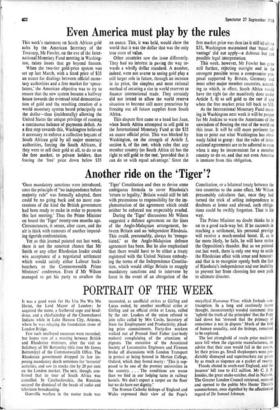Another ride on the 'Tiger'?
`Once mandatory sanctions were introduced, once the principle of "no independence before majority rule" was formally adopted, there could be no going back and no more con- cessions of the kind the British government had been ready to make in order to promote this last meeting.' Thus the Prime Minister on board the 'Tiger' twenty-one months ago. Circumstances, it seems, alter cases, and the air is thick with rumours of another impend- ing tigerish confrontation.
Yet as this journal pointed out last week, there is not the remotest chance that Mr Smith or any other Rhodesian leader could win acceptance of a negotiated settlement which would satisfy either Labour back- benchers or the Commonwealth Prime Ministers' conference. Even if Mr Wilson managed to get his party to swallow the 'Tiger' Constitution and then to devise some ambiguous formula to cover Rhodesia's `return to legality,' Britain would still be left with pretensions to responsibility for the im- plementation of the agreement which could neither be enforced nor respectably evaded.
During the 'Tiger' discussions Mr Wilson suggested a defence agreement on the lines of the Anglo-Malaysian arrangement, be- tween Britain and an independent Rhodesia. This could, presumably, always be 'renego- tiated,' as the Anglo-Malaysian defence agreement has been. But he also emphasised that there would have to be either a treaty registered with the United Nations embody- ing the terms of the Independence Constitu- tion, which would oblige Britain to reapply mandatory sanctions and to intervene by force in the event of an abrogation of the Constitution, or a bilateral treaty between the two countries to the same effect. Mr Wilson presumably calculates that, once they had turned the trick of selling independence to doubters at home and abroad, such obliga- tions could be swiftly forgotten. That is his way.
The Prime Minister no doubt thinks he is on to a good each-way bet. If he succeeds in reaching a settlement, his personal prestige will receive a much-needed boost. If, as is far more likely, he fails, he will have stolen the Opposition's thunder. But as we pointed out last week, there is only one way to settle the Rhodesian affair with sense and honour: and that is to recognise openly both the fact of Rhodesia's independence and our inability to prevent her from choosing her own path to ultimate disaster.










































 Previous page
Previous page